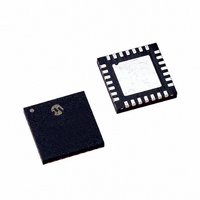PIC16F1938-I/ML Microchip Technology, PIC16F1938-I/ML Datasheet - Page 286

PIC16F1938-I/ML
Manufacturer Part Number
PIC16F1938-I/ML
Description
IC MCU 8BIT FLASH 28QFN
Manufacturer
Microchip Technology
Series
PIC® XLP™ 16Fr
Datasheets
1.PIC16F722-ISS.pdf
(8 pages)
2.PIC16LF1933-ISS.pdf
(508 pages)
3.PIC16LF1933-ISS.pdf
(46 pages)
4.PIC16F1938-ISS.pdf
(10 pages)
5.PIC16F1938-IML.pdf
(418 pages)
Specifications of PIC16F1938-I/ML
Core Size
8-Bit
Program Memory Size
28KB (16K x 14)
Oscillator Type
Internal
Core Processor
PIC
Speed
32MHz
Connectivity
I²C, LIN, SPI, UART/USART
Peripherals
Brown-out Detect/Reset, LCD, POR, PWM, WDT
Number Of I /o
25
Program Memory Type
FLASH
Eeprom Size
256 x 8
Ram Size
1K x 8
Voltage - Supply (vcc/vdd)
1.8 V ~ 5.5 V
Data Converters
A/D 11x10b
Operating Temperature
-40°C ~ 85°C
Package / Case
28-VQFN Exposed Pad, 28-HVQFN, 28-SQFN, 28-DHVQFN
Controller Family/series
PIC16F
No. Of I/o's
25
Eeprom Memory Size
256Byte
Ram Memory Size
1024Byte
Cpu Speed
32MHz
Package
28QFN EP
Device Core
PIC
Family Name
PIC16
Maximum Speed
32 MHz
Operating Supply Voltage
2.5|3.3|5 V
Data Bus Width
8 Bit
Number Of Programmable I/os
25
Interface Type
I2C/SPI/USART
On-chip Adc
11-chx10-bit
Number Of Timers
5
Lead Free Status / RoHS Status
Lead free / RoHS Compliant
Available stocks
Company
Part Number
Manufacturer
Quantity
Price
Part Number:
PIC16F1938-I/ML
Manufacturer:
MICROCHIP/微芯
Quantity:
20 000
- PIC16F722-ISS PDF datasheet
- PIC16LF1933-ISS PDF datasheet #2
- PIC16LF1933-ISS PDF datasheet #3
- PIC16F1938-ISS PDF datasheet #4
- PIC16F1938-IML PDF datasheet #5
- Current page: 286 of 418
- Download datasheet (7Mb)
PIC16F193X/LF193X
22.3.6
In Slave mode, the data is transmitted and received as
external clock pulses appear on SCK. When the last
bit is latched, the SSPIF interrupt flag bit is set.
Before enabling the module in SPI Slave mode, the clock
line must match the proper Idle state. The clock line can
be observed by reading the SCK pin. The Idle state is
determined by the CKP bit of the SSPCON1 register.
While in Slave mode, the external clock is supplied by
the external clock source on the SCK pin. This external
clock must meet the minimum high and low times as
specified in the electrical specifications.
While in Sleep mode, the slave can transmit/receive
data. The shift register is clocked from the SCK pin
input and when a byte is received, the device will gen-
erate an interrupt. If enabled, the device will wake-up
from Sleep.
22.3.6.1
In SPI daisy-chained configurations only the most
recent byte on the bus is required by the slave. Setting
the BOEN bit of the SSPCON3 register will enable
writes to the SSPBUF register, even if the previous
byte has not been read. Allowing the software to
ignore data that may not apply to it.
FIGURE 22-6:
DS41364C-page 286
SSPBUF to
SS
SCK
(CKP = 0
CKE = 0)
SCK
(CKP = 1
CKE = 0)
Write to
SSPBUF
SDO
SDI
Input
Sample
SSPIF
Interrupt
Flag
SSPSR to
SSPBUF
SSPSR
Buffer Overwrite Enable
SLAVE MODE
SLAVE SELECT SYNCRONIZATION WAVEFORM
bit 7
bit 7
bit 6
Preliminary
22.3.7
The SS pin allows a Synchronous Slave mode. The
SPI must be in Slave mode with SS pin control enabled
(SSPCON1<3:0> = 0100).
When the SS pin is low, transmission and reception are
enabled and the SDO pin is driven.
When the SS pin goes high, the SDO pin is no longer
driven, even if in the middle of a transmitted byte and
becomes a floating output. External pull-up/pull-down
resistors may be desirable depending on the applica-
tion.
When the SPI module resets, the bit counter is forced
to ‘0’. This can be done by either forcing the SS pin to
a high level or clearing the SSPEN bit.
Note 1: When the SPI is in Slave mode with SS pin
Shift register SSPSR
and bit count are reset
2: When the SPI is used in Slave mode with
SLAVE SELECT SYNCHRONIZATION
3: While operated in SPI Slave mode the
SMP bit of the SSPSTAT register must
remain clear.
control
0100), the SPI module will reset if the SS
pin is set to V
CKE set; the user must enable SS pin
control.
bit 7
bit 7
enabled
bit 6
© 2009 Microchip Technology Inc.
DD
.
(SSPCON1<3:0>
bit 0
bit 0
=
Related parts for PIC16F1938-I/ML
Image
Part Number
Description
Manufacturer
Datasheet
Request
R

Part Number:
Description:
IC, 8BIT MCU, PIC16F, 32MHZ, SOIC-18
Manufacturer:
Microchip Technology
Datasheet:

Part Number:
Description:
IC, 8BIT MCU, PIC16F, 32MHZ, SSOP-20
Manufacturer:
Microchip Technology
Datasheet:

Part Number:
Description:
IC, 8BIT MCU, PIC16F, 32MHZ, DIP-18
Manufacturer:
Microchip Technology
Datasheet:

Part Number:
Description:
IC, 8BIT MCU, PIC16F, 32MHZ, QFN-28
Manufacturer:
Microchip Technology
Datasheet:

Part Number:
Description:
IC, 8BIT MCU, PIC16F, 32MHZ, QFN-28
Manufacturer:
Microchip Technology
Datasheet:

Part Number:
Description:
IC, 8BIT MCU, PIC16F, 32MHZ, QFN-28
Manufacturer:
Microchip Technology
Datasheet:

Part Number:
Description:
IC, 8BIT MCU, PIC16F, 32MHZ, SSOP-20
Manufacturer:
Microchip Technology
Datasheet:

Part Number:
Description:
IC, 8BIT MCU, PIC16F, 20MHZ, DIP-40
Manufacturer:
Microchip Technology
Datasheet:

Part Number:
Description:
IC, 8BIT MCU, PIC16F, 32MHZ, QFN-28
Manufacturer:
Microchip Technology
Datasheet:

Part Number:
Description:
IC, 8BIT MCU, PIC16F, 20MHZ, MQFP-44
Manufacturer:
Microchip Technology
Datasheet:

Part Number:
Description:
IC, 8BIT MCU, PIC16F, 20MHZ, QFN-20
Manufacturer:
Microchip Technology
Datasheet:

Part Number:
Description:
IC, 8BIT MCU, PIC16F, 32MHZ, QFN-28
Manufacturer:
Microchip Technology
Datasheet:

Part Number:
Description:
MCU 14KB FLASH 768B RAM 64-TQFP
Manufacturer:
Microchip Technology
Datasheet:

Part Number:
Description:
7 KB Flash, 384 Bytes RAM, 32 MHz Int. Osc, 16 I/0, Enhanced Mid Range Core, Low
Manufacturer:
Microchip Technology

Part Number:
Description:
14KB Flash, 512B RAM, 256B EEPROM, LCD, 1.8-5.5V 40 UQFN 5x5x0.5mm TUBE
Manufacturer:
Microchip Technology
Datasheet:











